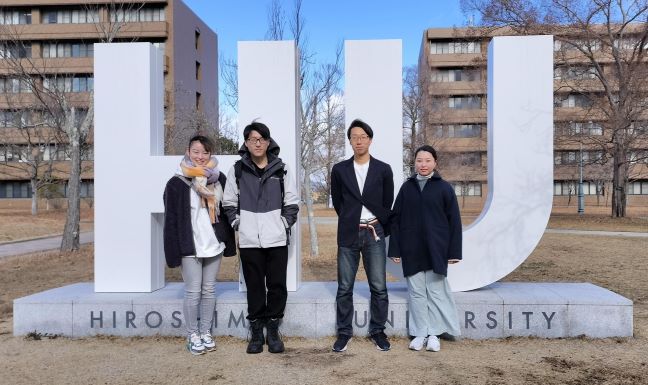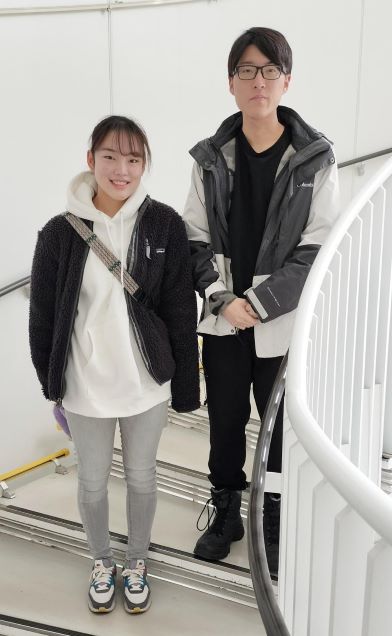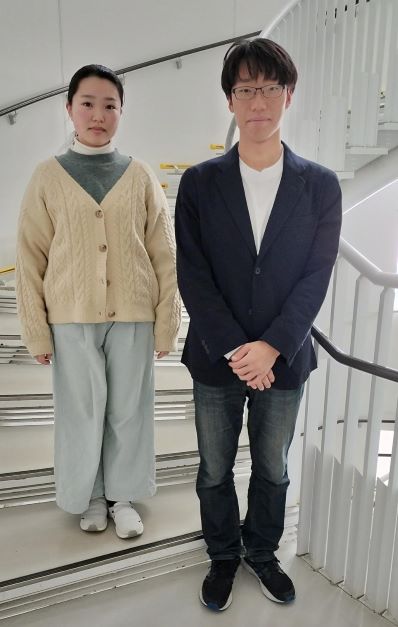“Higashi Hiroshima City Student Startup Challenge” has selected 10 teams and two teams that participated in the agile workshop have decided to take on the challenge of starting a startup. With a grant of up to 400,000 yen, they have spent about three months refining their ideas with advice from Hiroshima University faculty and venture capitalists. Then, on December 17th, we held a major event to announce the results!
The “East Hiroshima City Student Startup Challenge” is a program that provides students (including graduate students) from three universities in East Hiroshima City (Hiroshima University, Kinki University Faculty of Engineering, Hiroshima International University) with the opportunity to turn their free and creative ideas and entrepreneurial aspirations into reality.
https://www.hiroshima-u.ac.jp/iagcc/news/80794

Why not join the agile program and bring your ideas and entrepreneurial aspirations to life?
 |
“Campus Accessibility for All: Expanding HirodaiMAPs to the Higashi Hiroshima Campus” https://www.hiroshima-u.ac.jp/iagcc/news/80636 [Proposal Representative] Yunosuke Ikeda, 4th year, Division III, Faculty of Engineering, Hiroshima University [Members] Sena Matsuda, 2nd year, Department of General Sciences, Faculty of Integrated Arts and Sciences, Hiroshima University |
Yunosuke Ikeda
4th year, Division III, Faculty of Engineering, Hiroshima University
◆Reasons for applying to the Agile Workshop:
I applied to the program for the following three reasons:
1. I wanted to establish a relationship with Hiroshima City from the perspective of digital transformation (DX). While I had a good understanding of the technologies involved in implementing DX, I believed it was equally important to deepen my understanding of the fields where DX could be applied. Therefore, the concept of DX and entrepreneurship, which is one of the main focuses of this program, felt particularly attractive to me.
2. I wanted to learn about resilience and mobility. The reason for this is that I have previously taken courses such as “City Engineering in IIT Bombay” offered by Hiroshima University and the “Covid19 pandemic and Urban Resilience” lecture in the E-start program, and I was particularly interested in the intersection between these lectures and entrepreneurship.
3. While I have been conducting research related to carbon neutrality, I realized that I had only been focusing on the technological aspects needed to achieve it. I wanted to learn about carbon neutrality from a broader perspective and reconfirm the significance and position of my own research.
◆What I have learned and can learn from the Agile Workshop:
1. It provided a good opportunity for me to learn about the initiatives being undertaken by my own city, Hiroshima (e.g., industry-academia collaboration projects, the existence of the TGO App).
2. I developed the ability to collect data in a short period of time and effectively organize and present it. In this program, there was a need to quickly go through the process of theme setting, research, and presentation within about a week. It was challenging, but I felt that this skill could be applied to any presentation.
3. I realized that even with differences in country, culture, and language, constructive discussions can be held as long as there is a solid underlying logic. Therefore, I believe it is effective to regularly think logically in my native language. I also recognized that the discussion styles of Japanese students and students from other countries differ significantly. Broadly speaking, Japanese students have a strong tendency to listen and understand others’ opinions, while students from other countries tend to strongly assert their own opinions. At first glance, foreign students who express their opinions seem more actively engaged in discussions, but I felt that the Japanese-style approach is also necessary in terms of listening to various opinions, capturing their characteristics, and proposing compromises or alternatives.
◆How the Agile program has been helpful for the startup challenge:
1. It opened up the option of international expansion for our service. Previously, when creating a service, I did not consider expanding overseas, but through this program, I started considering international expansion.
2. I became more familiar with creating presentations. From the experience of condensing the process of theme setting, research, and presentation into one week for the final presentation, I found that I was able to smoothly create presentations in the startup challenge.
3. My spirit of “just giving it a try” has been strengthened. I used to draw a line and think that people involved in large businesses live in a different world from me, but I learned that many challenges are born from small things. This gave me the confidence to try things out. Additionally, I realized that funding and joint ventures are often formed through personal connections, so in the startup challenge, I actively went to talk directly with various people. Thanks to this, new business opportunities came my way and became small successes.
◆Message to students considering participating in the Agile program:
As I mentioned in the “What I have learned” section, I believe that most students will be overwhelmed by the differences in discussion styles from other countries. Of course, generating many ideas and expressing your own opinions are important aspects of discussions, but listening skills, which Japanese students excel at, are also crucial. For those who are good at expressing their opinions, it is fine to engage in spirited back-and-forth discussions with students from other countries, but for students who are not as outspoken, there is still an important role in listening to and summarizing the opinions of group members. I encourage you to take on the challenge.
Sena Matsuda
2nd year, Department of General Sciences, Faculty of Integrated Arts and Sciences, Hiroshima University
◆Reason for applying to the Agile Workshop
I attended a kickoff meeting where representatives from the affiliated schools of the Agile Program gathered in March to discuss the program as a student staff member of another program. I learned about the Agile Workshop there. Afterwards, I saw the application for the summer program at Momiji and learned that I could have an exchange with international students. So, I decided to participate because I was confident that I could deepen my exchange and broaden my perspective through various lectures and discussions.
◆What I learned or can learn from the Agile Workshop
Until now, I had almost no knowledge about entrepreneurship and never even thought of creating my own business model. However, through discussions with students specializing in various fields and backgrounds, I learned the importance of understanding a problem from multiple perspectives and approaching it from different angles to solve it. Additionally, this workshop also served as an opportunity for us to think about the problems that Hiroshima faces currently. We focused on the problems on our campus, merged our abilities and interests, and were able to establish a foundation for considering whether they could become viable businesses.
◆How the Agile Program helped with the Startup Challenge
Through participating in the program, I was not only able to meet members whom I could grow with, but also found a group where we could mutually benefit each other. Additionally, although I started the program with little knowledge about business model design and entrepreneurship, through learning and experiencing this field, I was able to utilize it to establish a foundation for designing business models in the Startup Challenge. This included focusing on the problems on our campus, merging our abilities and interests, and considering whether they could become viable businesses.
◆Message to students considering participating in the Agile Program
Even if you initially have no interest in entrepreneurship, through discussions with international students specializing in various fields, you will not only be able to think about contemporary problems but also learn the importance of looking at problems and challenges from various perspectives. So, even those who are interested in things other than entrepreneurship, please consider participating.
 |
“Leader and Club Activity Matching Program” https://www.hiroshima-u.ac.jp/iagcc/news/80643 [Proposal Representative] Yusei Inoue, 1st year, Information Science, Faculty of Information Sciences, Hiroshima University [Members] Suzuko Matsuura, 1st year, Japanese Language Education Course, Third Division, Faculty of Education, Hiroshima University |
Suzuko Matsuura
1st year, Japanese Language Education Course, Third Division, Faculty of Education, Hiroshima University
◆Reason for applying to the Agile Workshop
I didn’t usually study the themes of this workshop, but I wanted to challenge something new, so I decided to apply. During summer break, I wanted to engage in new activities, so I was searching for information when I found the Agile Workshop and another similar program. The other program involved Asian university students coming to Hiroshima University during summer break to collaborate on activities. Initially, I was considering participating in the other program, but since I had participated in many international exchange events before, I didn’t think there was anything new about introducing Hiroshima and Hiroshima University for cultural exchange. Therefore, I became more interested in the academic aspect of Agile. Looking at the schedule, there was a session on resilience, and since I had previously researched resilience during high school, I decided to participate.
◆What I learned or could learn from the Agile Workshop
In this workshop, I was able to learn about entrepreneurship, carbon-neutral, DX, and mobility, as well as companies and corporations. For me, all of these were new fields that I had never studied before, so during the workshop, I borrowed books on the workshop theme and read them during my free time. However, it was really difficult to fully understand the lessons. Nevertheless, the members who gathered this time were diverse, ranging from undergraduate students to graduate students, and their fields of specialization were also diverse. Therefore, even if I didn’t understand something specialized, the people around me supported me, and I was able to challenge myself step by step within my abilities and a little beyond. It was very reassuring to have an environment where I could try even if I didn’t know something and get advice and help when I was in trouble.
Furthermore, it wasn’t easy to learn about new concepts and domains using English, but my English skills greatly improved. I was able to express my detailed feelings and values in English and had the experience of being understood, which was a first for me and made me very happy. When I visited my hometown during summer break, I found myself accidentally responding in English, explaining things, and even talking to myself. During the workshop, I had classes and discussions in English for long hours every day, and amidst those conversations, I was surprised to find that I had naturally transitioned from feeling like I was speaking English to simply expressing what I wanted to say.
During the discussions about mobility, I learned that there are countries with services that don’t exist in Japan and that transportation circumstances greatly differ between countries. I had various realizations. Since there were also workshops for cultural exchange, I think we were able to teach each other about other countries and cultures. Personally, it was interesting to have participants from the UK, Australia, and India who spoke English in different ways.
◆How the Agile program was useful for the Startup Challenge
The reason I participated in the Startup Challenge this time was because a friend I got along with during Agile wanted to take on the challenge, and I became interested in their idea as well. While I was interested, I had never thought about becoming an entrepreneur or anything like that before, so I was hesitant. However, through the Agile program, I strongly began to think, “There are still many things in the world that I don’t know, and I want to learn them. I want to live a life of continuous learning.” Therefore, instead of thinking, “Let’s quit because I don’t understand it well,” I decided to participate with the mindset of “Let’s try it precisely because I don’t understand it well.”
If I hadn’t participated in Agile, I wouldn’t have met that friend, and I would have never thought about challenging a startup. Therefore, I believe that the program with the unique feature of Agile had a significant impact on my life.
◆Message to students considering participating in the Agile program
When I decided to apply for the program, I was filled with doubts such as “I know nothing about entrepreneurship… I am not particularly good at computers… Is it really okay for me to join?” However, once the program started, I found myself surrounded by precious friends. Throughout the duration, we went to festivals together, went shopping and karaoke singing, had meals together, and even stayed up all night. We shared many intense and enjoyable moments. The karaoke during that time was the most fun I’ve ever had. I was able to sing naturally, laugh a lot, and enjoy it so much that I thought there couldn’t be a better karaoke experience. I still keep in touch with those friends through social media, sharing our activities and celebrating birthdays.
When it came to discussing things in English, I initially thought it would be difficult to participate and that I might end up just listening because I wouldn’t be able to express what I wanted to say. However, I was surprised that I could actively participate in discussions and gained confidence in communicating in English. I was happy that I could contribute to the team with what I was capable of as a team member. This was made possible because the team leader was approachable and kind, and the team members were cooperative and kind as well. Another reason is that the topics discussed were Higashi-Hiroshima, which I was familiar with. But above all, I knew that as a first-year student, I didn’t have much specialized knowledge, so I always actively sought opportunities to contribute. I believe I was able to find chances and take action on my own.
If you are someone who wants to try something new, or even if you simply want to grow even just a little, or if you are intrigued by the program’s content, I think this is a great opportunity to challenge yourself with new and high-level things. I recommend this program!
Yusei Inoue
1st year, Information Science, Faculty of Information Sciences, Hiroshima University
◆ Reasons for applying to the Agile Workshop
The theme of the workshop was DX, which was closely related to my area of expertise. Additionally, it provided an opportunity to learn English. This sparked my interest and I really wanted to participate. However, the content seemed advanced and I was unsure if I was suitable for it, so I initially decided not to apply. But since I had come all the way to university, I thought I might as well give it a try, even though I wasn’t sure if I would be accepted. So, somewhat carelessly, I submitted the application form.
In addition, during high school, I didn’t have many opportunities to interact with foreigners due to the influence of infectious diseases. So, I really wanted to have such an opportunity in university. Since this workshop was going to be held in Japan, it was one of the reasons why it was easier for me to participate.
◆ What I learned from the Agile Workshop and what I can learn
I realized how limited my perspective of the world was. Within the team, there were members with drastically different ways of thinking, even with regards to simple matters like time. Through this, I had the opportunity to experience diverse values such as the team’s attitude towards reaching a goal and how to collaborate within it, which was a very valuable experience. In the process, I was able to incorporate aspects that I admired in others into myself, as well as clearly identify my own strengths. Furthermore, I learned the importance of taking a step forward and trying, and that it is okay to be appropriately casual in a positive way through this program.
Trying things first and then making new judgments and challenges based on what becomes visible. Although I understood the importance of this, there were many times when I couldn’t take the first step due to anxiety. However, through my participation in the Agile program and all the interactions I had with my foreign friends, I feel like I learned the positive side of being appropriate. Additionally, having companions whom I can spend enjoyable time with despite having different ways of thinking and values is a lifelong treasure.
It was a major turning point in my life.
◆ How the Agile program helped in the Startup Challenge
Having supportive companions was the biggest support for me.
The idea I proposed this time was something I had come up with in high school. However, I couldn’t proceed with it because I believed that I didn’t have the ability to make it a reality. Through the Agile program this summer, I learned about the Startup Challenge. As I was discussing my idea, the members around me provided many opinions. Some even offered to provide technical support.
Through such interactions, I gradually started to believe that I could do it too. In fact, the members I worked with as part of the team this time were the same members I met in the summer, and there were members who provided technical support during the activity period.
◆ Message to students considering participating in the Agile program
I hope that those who want to challenge something but haven’t found anything yet, or those who don’t have the courage to take a big step, will try various challenges. I believe that entrepreneurship is not only necessary for entrepreneurs but also a mindset and mindset that everyone needs in this VUCA era. I think it was very significant to learn the foundation of this mindset.
Being able to spend time with progressive students from around the world is a very valuable experience.
If you’re hesitant, just take the first step. The world you see will change.